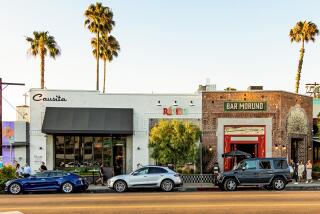Amid coronavirus, West Hollywood’s LGBTQ community hears echoes of the AIDS crisis
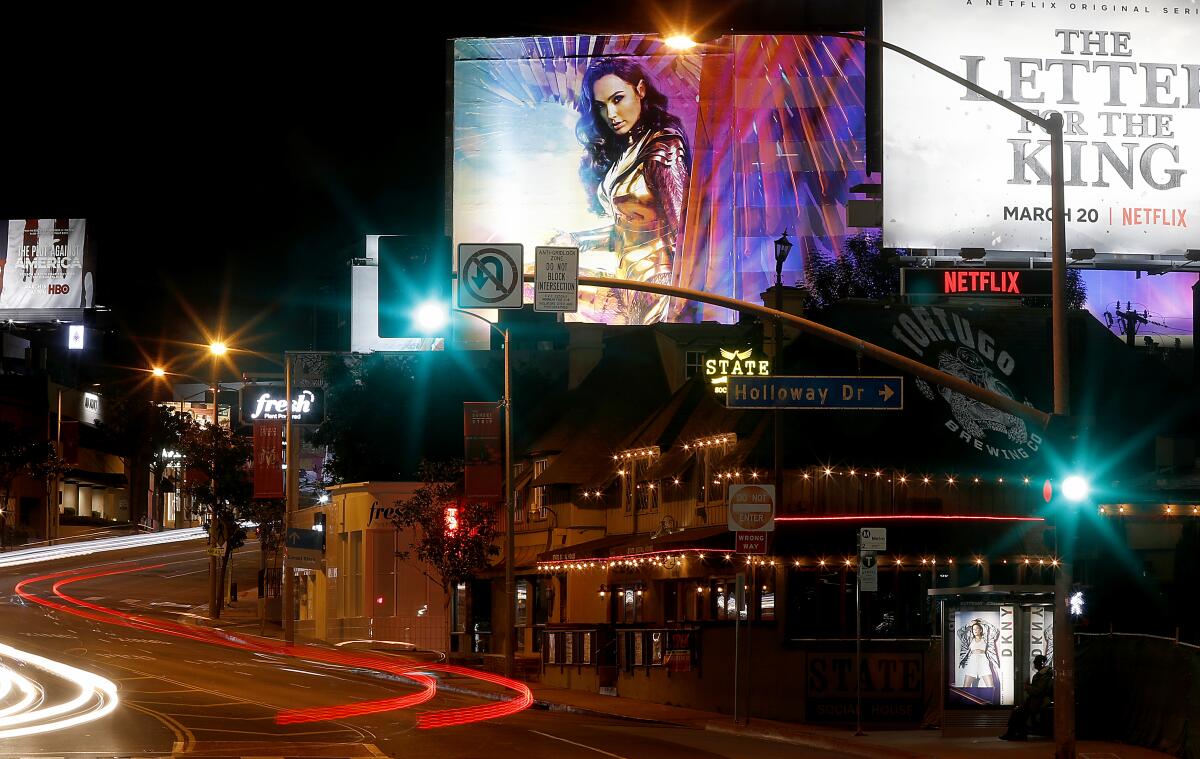
- Share via
This month, David Cooley, owner of the iconic West Hollywood LGBTQ club the Abbey Food & Bar, watched in horror as news changed by the hour — as restaurants shut in France, as countries sealed their borders with Italy, as friends in Barcelona were quarantined.
Cooley recognized the severity of the situation and acted before others did — partly because the new pandemic instantly recalled another health crisis that slammed his community 40 years ago. He closed the Abbey and its sister club, the Chapel, on March 12, four days before Los Angeles County mandated that bars bolt their doors amid coronavirus fears.
And he worried that young people — who weren’t alive in the early 1980s when the first news reports broke about a mysterious “gay cancer” stalking U.S. cities — weren’t taking the new menace seriously enough.
“I lived through the AIDS crisis,” he said. “I was marching the streets and telling the people to get out of the bars and go home.”
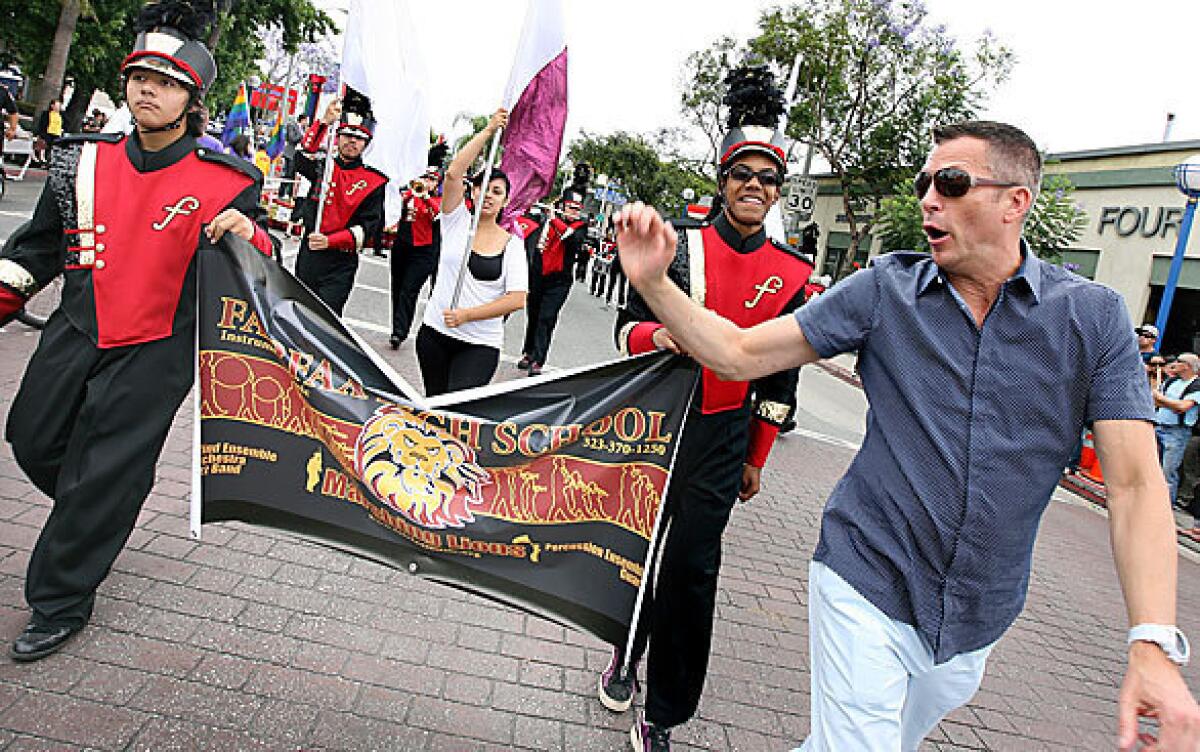
It was the first time that Cooley had closed his business in 29 years.
Last week, as New York, San Francisco, Los Angeles and other metropolises closed businesses and restricted public movement, Cooley and other business owners along the Santa Monica Boulevard strip — the heart of the Los Angeles LGBTQ community — said it was surreal to see the area so desolate. The blocks-long parade of bars and restaurants resembled a tranquil suburb more than the vibrant “Boystown.”
The virus is affecting the LGBTQ community in numerous ways. Organizers have announced that all events related to L.A. Pride in June will be postponed because of the pandemic. On Wednesday, officials announced that West Hollywood Mayor John D’Amico has tested positive for the coronavirus and is quarantined at home. With 19 confirmed cases, West Hollywood has the most per capita in L.A. County.
Midafternoon Thursday, when clubs and bars normally would be preparing to open, the area was crisp and sunny but quiet. Scattered people walked dogs or jogged down Santa Monica, some wearing masks, but street parking was abundant and many establishments were dark, with printed notices about the coronavirus taped to their doors.
Laurie Marhoefer, an expert on 20th century LGBTQ history and politics at the University of Washington, said the coronavirus could bring back traumatic memories for gay people who survived the AIDS crisis. For many, those years were marked not only by fear of acquiring a deadly disease but also by anxiety over the vitriol directed at gay people for supposedly practicing a risky and promiscuous “lifestyle” — and rage at the seeming indifference of many politicians to swiftly address the outbreak.
Foreshadowing the current furor over President Trump’s use of the term “Chinese virus,” issues of social stigmatization overshadowed the AIDS crisis. In Cuba, HIV-positive people were quarantined against their will, as were Haitian refugees.
“The parallels are eerie, though, yes, the viruses are very, very different — all the misinformation, all the rumors, the confusion and fear mixed together, not knowing what’s safe and what isn’t, not knowing how much worse this will get, or who might get sick,” Marhoefer said. “The isolation we’re all experiencing now is probably affecting this community in a particularly sharp way, because of this history.”
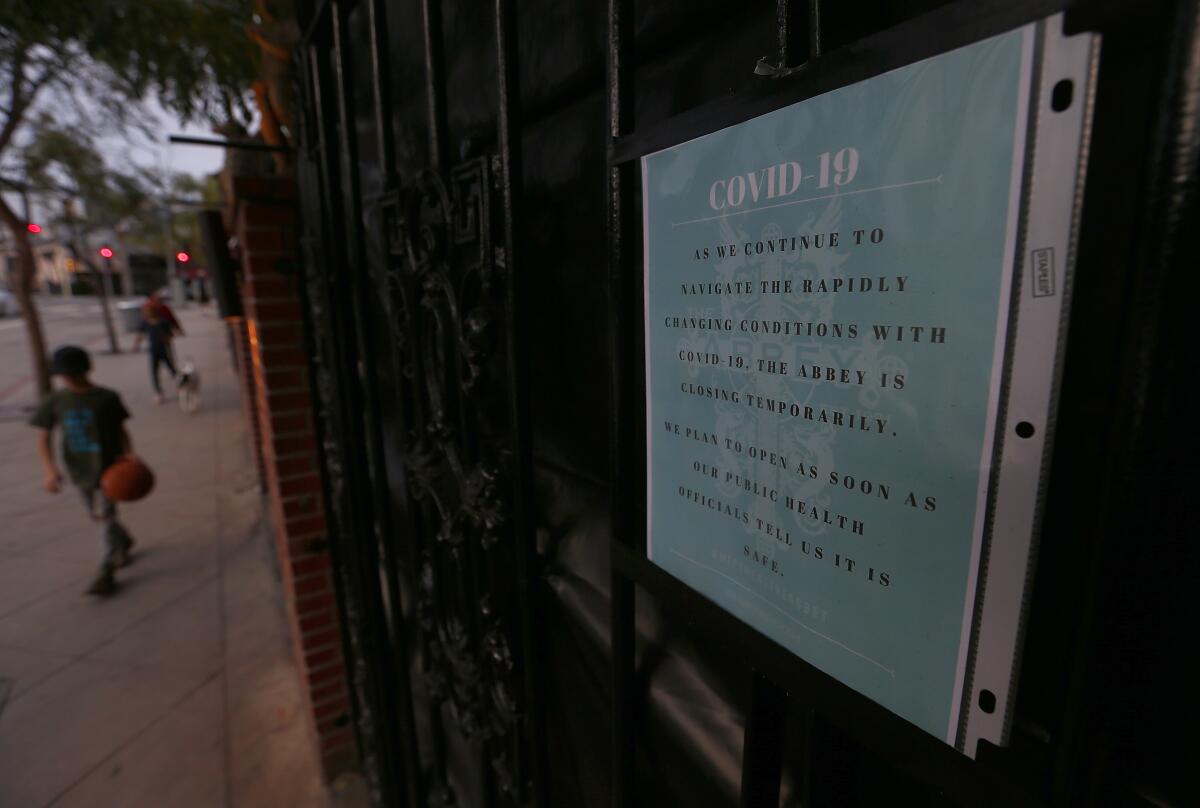
After the Abbey closed, Cooley’s staff divvied up the remaining inventory of food and took home grocery bags.
He also posted a letter on the Abbey’s website. “I know this will hurt my staff, some of which have been with me for 29 years, my loyal guests who have made the Abbey part of their lives, and my community, who will no longer have the Abbey as a safe space to support each other during the crisis,” he wrote.
In the early ’90s, the Abbey, then a cafe, was a meeting place for gay people to safely discuss the AIDS epidemic. Cooley sees similarities between that time and now.
“People are not taking this as seriously as they should,” he said. “During the AIDS crisis, people were still going out and people just thought they were above it, that they wouldn’t get sick. This could spread even more rapidly.”
Others don’t see the same parallels.
Michael Niemeyer, who owns the club Micky’s West Hollywood, said he sees the coronavirus distinctly because of the way it’s evidently transmitted — through breathing and touching, rather than through blood and other bodily fluid transfer.
“Plus,” he said, “I come from a time when government officials thought closing a gay bar was their civic duty.”
Niemeyer acknowledged that he didn’t realize the gravity of the new coronavirus at first, equating it to a regular flu. On March 15, before the state and L.A. stay-at-home directives went into effect, the handful of bartenders working at Micky’s wore latex gloves. Customers made few comments about the virus, and the patio was packed.
That day, Niemeyer was visiting family in Florida, who persuaded him to take the virus more seriously. He flew to Columbus, Ohio, and looked at renting a car in case flights to L.A. were canceled. It cost $640 a day. He decided it was time to close the bar.
“I don’t know if we should have closed earlier,” he said. “I’ve been in the gay bar business for 40 years, so I’ve seen everything but this.”
Niemeyer said he worries most about his 48 employees who are now out of work, especially those such as DJs and dancers who are independent contractors. He also worries particularly about LGBTQ people of color who visit from neighborhoods where there aren’t as many queer-friendly spaces.
“I think, if we’re closed for very long, it’s going to be very unhealthy for us, mentally, psychologically. Online is great, but you still need to know there’s a community. One of the things people love about West Hollywood — not just the bars — is that it’s a really pedestrian place,” he said. “I don’t think we’re all that liberated in this case that we don’t need a neighborhood.”
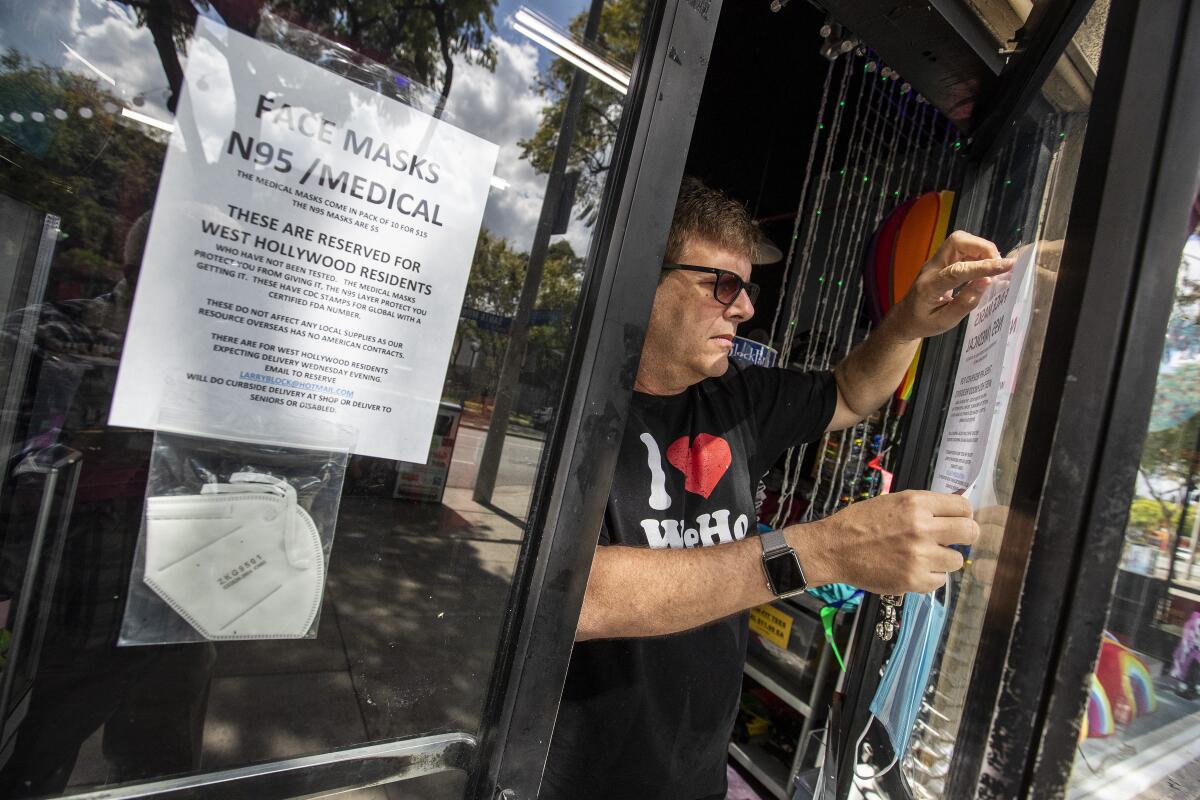
Larry Block, who owns the gay-friendly boutique Block Party WeHo, said Thursday that business was down by 80%. That night, Los Angeles County issued sweeping new rules to limit the spread of the virus, including ordering retail businesses that are considered nonessential to shut down.
Block closed his doors. He had already purchased 6,000 masks from a vendor in China exclusively for West Hollywood residents. He said he donated 130 to a group that advocates for homeless people in the area, is giving away others to seniors, disabled people and those in affordable housing, and is selling the rest.
Block said his brother, who lived in China until February, is sick with COVID-19 symptoms. He said he’s supplying a necessity for local residents, despite criticism that he’s contributing to mask shortages affecting front-line healthcare workers.
“We have to be extra vigilant,” he said. “It’s so concentrated here. People are asymptomatic.”
He fears that the long-term economic effects of the coronavirus could speed up a gentrification process already underway in the neighborhood.
“I look at this as almost a tremendous undertow that can suck out the last bastion of what we have here in our community,” he said, “before the big money comes in and buys it at a discount rate, and then all the sudden the gay bar is just a straight bar and the Block Party turns into American Apparel.”
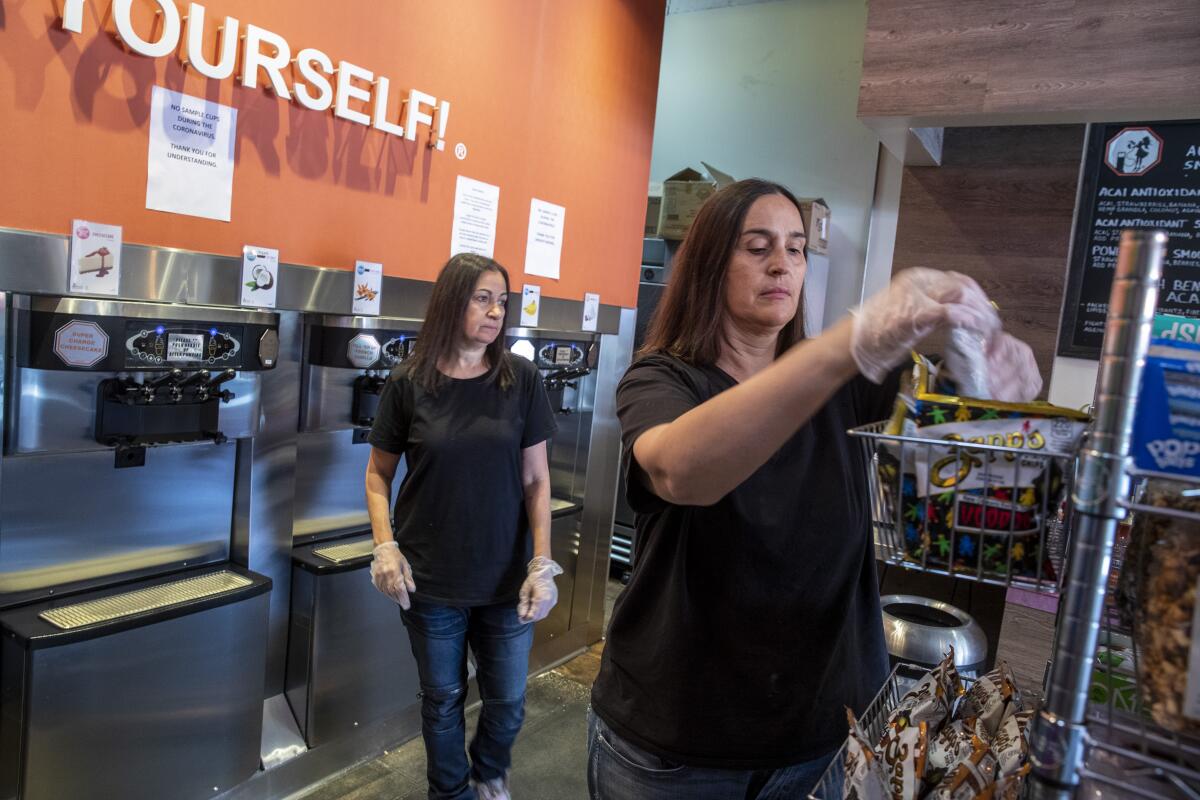
Amid the uncertainty, one business seemed to be weathering the storm. Shoshana Joseph and her wife, Marta Knittel, own Yogurt Stop, which has become one of the last late-night businesses on the strip. The shop cut back hours but is still open until 2 a.m. Friday through Sunday.
Seeing the owners there an hour before their new opening time Thursday, two women hesitantly walked up to the shop. Joseph waved them in.
“Hi, ladies,” she said. “We’re open for you.”
Since the most recent county directive, nearly all orders come through online delivery services. Yogurt Stop is one of the few LGBTQ-owned small businesses left in the area. Joseph said her goal is just to stay afloat through the pandemic.
“I think people need familiarity right now,” she said.
More familiarity came Sunday afternoon in the form of a livestreamed drag show organized by the country-western-themed club Flaming Saddles. Brunch couldn’t be served, but looks would be.
More to Read
Sign up for Essential California
The most important California stories and recommendations in your inbox every morning.
You may occasionally receive promotional content from the Los Angeles Times.

